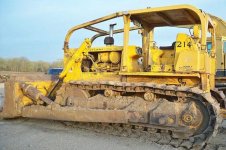Here's the situation.
1973 TD-25C. Turbo starts making some noise, like a knock or loud tap. Sound goes away. Engine starts running like crap (i.e., no power -but idles fine). Shut down the engine, pulled the turbo and sure enough, it needed a rebuild. Not seized, but the bearings were definitely pooped out and the fan blades were wedged in the housing.
Installed rebuilt turbo and...no difference. Still has no power. Like barely enough to move itself and thats it. Changed fuel filters, air filter and put fresh diesel in it.
Any thoughts???
1973 TD-25C. Turbo starts making some noise, like a knock or loud tap. Sound goes away. Engine starts running like crap (i.e., no power -but idles fine). Shut down the engine, pulled the turbo and sure enough, it needed a rebuild. Not seized, but the bearings were definitely pooped out and the fan blades were wedged in the housing.
Installed rebuilt turbo and...no difference. Still has no power. Like barely enough to move itself and thats it. Changed fuel filters, air filter and put fresh diesel in it.
Any thoughts???


